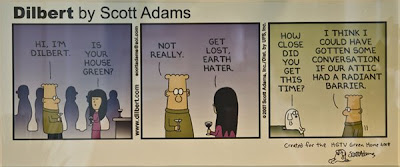The book Green to Gold (2006) tackles the burgeoning world of green business revenue and aims to be pragmatic in a niche where “over 95 percent of the stories and examples talked only about the benefits of environmental thinking.” Many businesses are enthusiastically fueling the green movement and it is critical to remember that “no business strategy works all the time” . The authors’ realistic approach is still optimistic, but they have sought out the book’s information with the specific aim of presenting a non-idealized view in the burgeoning domain where ecology and business meet.
Green to Gold presents some key strategies and thoughts about going ‘green’ in the business world. My favorite is: “Climate change is shaping up to be the biggest environmental strategy issue the business world has ever faced.” The authors employ metaphors from economic jargon: “Natural resources are the assets on the planetary balance sheet.” The aims of getting ahead and making a profit are still in play, but the notion of a greater ecological and human good are also addressed.
Eco-chic and green business initiatives are excellent and simultaneously problematic. As the July 1, 2007 article called “Buying Into the Green Movement” stated in the New York Times:
Consumers have embraced living green, and for the most part the mainstream green movement has embraced green consumerism. But even at this moment of high visibility and impact for environmental activists, a splinter wing of the movement has begun to critique what it sometimes calls “light greens” .
[Though it should (as I stated at the outset of this post) be out of the realm of politics and climate change, we can choose to consider this as well if that is on your agenda.] The global climate and carbon footprint problems we are facing are too large in scope to be bought by consumers who propone the same life style choices, overall. Simply buying green stocks while not recycling and driving an SUV will not bring us anywhere in the grand scheme of things.
We need to educate ourselves and make smart, green, lifestyle decisions. Since many businesses and marketing campaigns have aimed at green images, it is the consumer’s responsibility to be discerning. An accessible space for information about this new intersection of ecology and business is the weekly video news podcast called ECOBIZ. Sponsored by Citi Smith Barney, this video podcast is free, straightforward, interesting, and encouraging in many ways. The website falls under the umbrella of the Sundance Channel.
Environmental sustainability and social change are the broad topics attended to by a great podcast (in video): ECOBIZ, but the information embedded in any given episode can lead to a quickly snowballing interest. For example, the episode about the Terra Pass, if one’s interest is sparked, can lead to the company’s website, a potential purchase in one of many areas, and even to joining the Terra Pass Facebook group. The ease of the modern American consumer is all-too evident between TerraPass and the plethora of businesses going green to gain our business.
A wide range of individuals and companies are featured, and Emmy-Award winning Allison Stewart, who serves as the podcast’s anchor. The episode’s features have included Timberland, Terra Pass, Emory Knoll Farms, Recycline, Ben and Jerry’s, and The Sallan Foundation; these companies are all making environmentally conscious steps in different ways. These segments validate the opportunity that the green movement has augmented.
There is intangible brand value in marketing your entire company as environmentally friendly, but it is more than painting the façade of your company headquarters green. The innumerable websites, podcasts and books on this ‘green’ topic are successful because being informed is the only feasible preparation for the future of corporations; a green image may suffice for now, but not for long. Knowledgeable, committed consumers are making demands for transparency of policies in companies. Companies are being asked about their environmental footprint, from alternative energy investment, office policies, waste management, architectural choices, ad infinitum.
The social sites, podcasts and blogs (like my own) are changing media, and by extension the issue of our “e-waste.” The question of what to do with all the outdated electronic material is pressing, as “every old computer has about four pounds of toxic materials including […] flame retardants, lead, cadmium, and mercury. Given that over 300 million computers are awaiting disposal in the United States alone, the toxic waste math is not pretty.” ReCellular is yet another eco-smart business, which was created “to refurbish, reuse and responsibly recycle discarded cell phones.” It is “the world's largest recycler and reseller of used cellular phones and accessories.” Companies like this one are innovating and changing the notion of green business. They have a green hue in more than their appearance: they are building a green business out off sustainable practices and using waste materials to generate new revenue.



